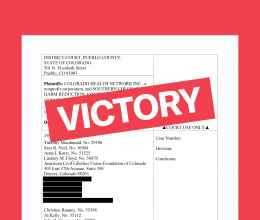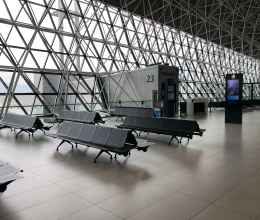The Lawsuit Seeks an Emergency Order to Protect High-risk People in Jail From COVID-19
DENVER – A team of ACLU and civil rights attorneys filed a class action lawsuit last night in federal court, seeking an emergency order to compel Weld County Sheriff Steve Reams to comply with COVID-19 public health guidelines – including physical distancing – for all high-risk people being held in the Weld County Jail.
“We have written to Sheriff Reams; we have written to the Chief Judge in Weld County; and we have petitioned the Colorado Supreme Court,” said ACLU Legal Director Mark Silverstein. “But the recipients of these pleas did not respond with the actions that were urgently required to prevent the calamity now unfolding in the Weld County Jail — an outbreak with multiple confirmed cases of COVID-19. We are now asking the federal court to order the desperately needed protective measures to save lives.”
According to the lawsuit, the Weld County Sheriff failed to take adequate measures to protect people in jail, correctional staff and the public from COVID-19, resulting in a substantial outbreak in the Weld County Jail. Weld County itself is a hot spot for the virus, with the fourth highest number of infections in the state and the highest death rate of Colorado counties. To comply with public health guidelines, the Sheriff must ensure that people who are incarcerated can maintain at least six-feet of distance at all times. Weld is the sixth most populous jail in Colorado and currently houses 574 people, many of whom are at high risk of serious illness or death from COVID-19 due to age or underlying health conditions. Adding to the cruelty of the circumstances, 70% of people held in the Weld jail are pretrial detainees, meaning they have not been convicted of a crime. They are locked up only because they cannot afford to pay their bond.
“While no one is safe from transmission of the virus, jails, by their very nature, are especially prone to being epicenters of disease,” explained attorney Andrew McNulty, of Killmer, Lane and Newman. “The Weld County Jail has willfully turned a blind eye to public health guidelines and as a result has put incarcerated people, correctional staff and the public at grave risk.”
On March 25, Governor Polis took executive action aimed at lowering jail populations, stating that, “Reducing the numbers of those arrested or incarcerated is vital to our efforts to limit and prevent the spread of COVID-19 in our communities.” On March 26, ACLU lawyers wrote to all Colorado sheriffs, including Sheriff Reams, detailing every sheriff’s societal and constitutional obligation to reduce jail populations immediately so as to allow physical distancing between and among people held in jail and staff. On April 3, criminal defense attorneys and advocacy groups filed two emergency petitions asking the state Supreme Court to issue a directive for lower courts to do their part to safely reduce the number of people incarcerated during this crisis. Those petitions were denied, leaving decisions about who will live or die in jails from COVID-19 up to individual sheriffs, judges and district attorneys.
“This lawsuit is necessary in part because of a failure of state-wide judicial leadership,” attorney David Maxted said. “Without statewide leadership, others like Sheriff Reams will continue to ignore science and data, and thereby endanger the public as a whole. COVID-19 is spreading like wildfire through the Weld County Jail, and only action by this court can change the deadly course of events unfolding there.”
The legal team filing the class action includes ACLU staff attorneys, Killmer Lane and Newman, LLP, David Maxted of Maxted Law LLC, Jamie Hubbard, of Stimson Stancil LaBranche Hubbard LLC, and ACLU Cooperating Attorneys Dan Williams and Lauren Groth.
For a list of resources and recent actions by ACLU of Colorado and others to stop the spread of COVID-19 in jails and prisons go to: https://aclu-co.org/doingmypartco/
###
The ACLU of Colorado is the state’s oldest civil rights organization, protecting and defending the civil rights of all Coloradans through litigation, education and advocacy.

